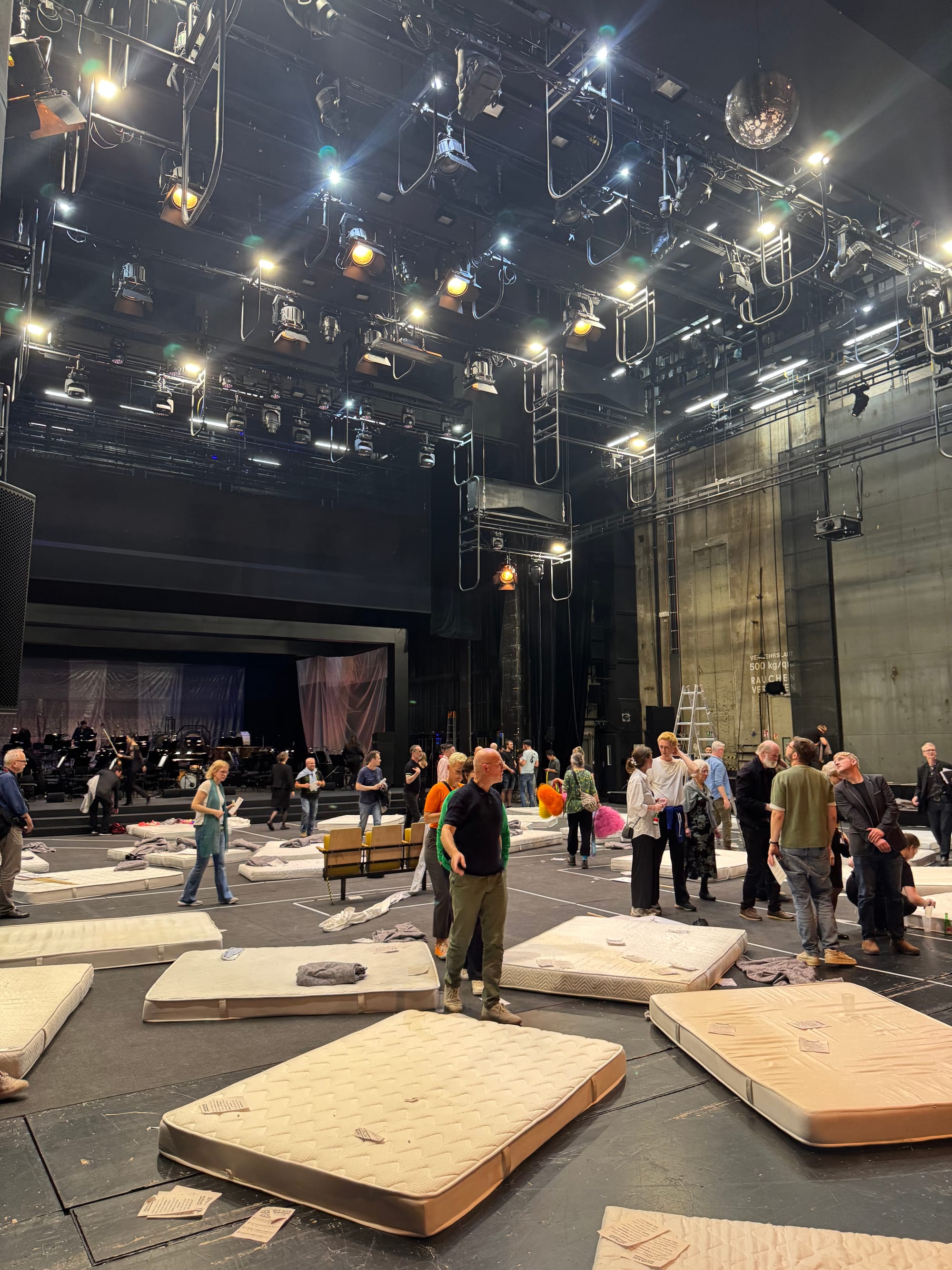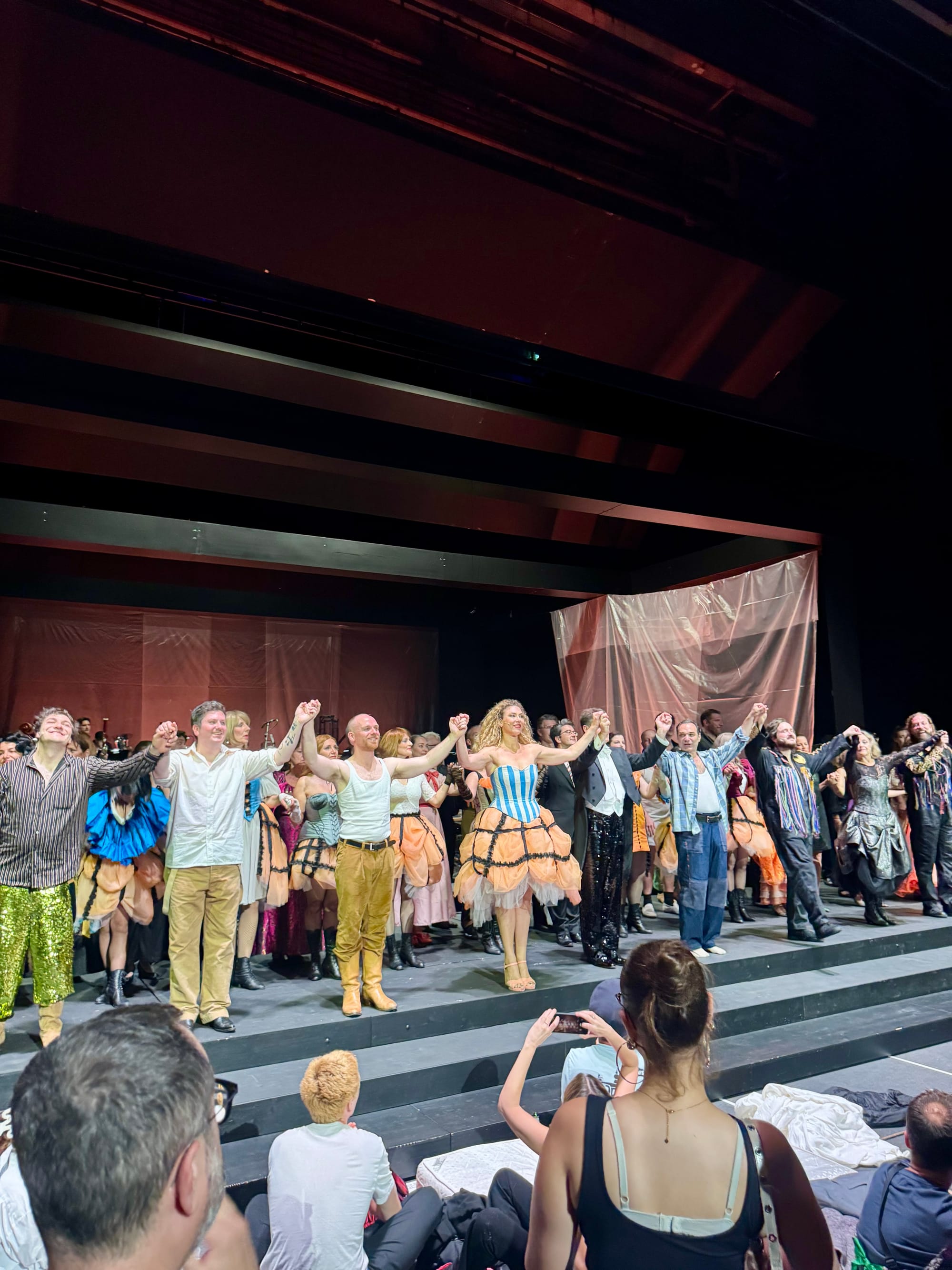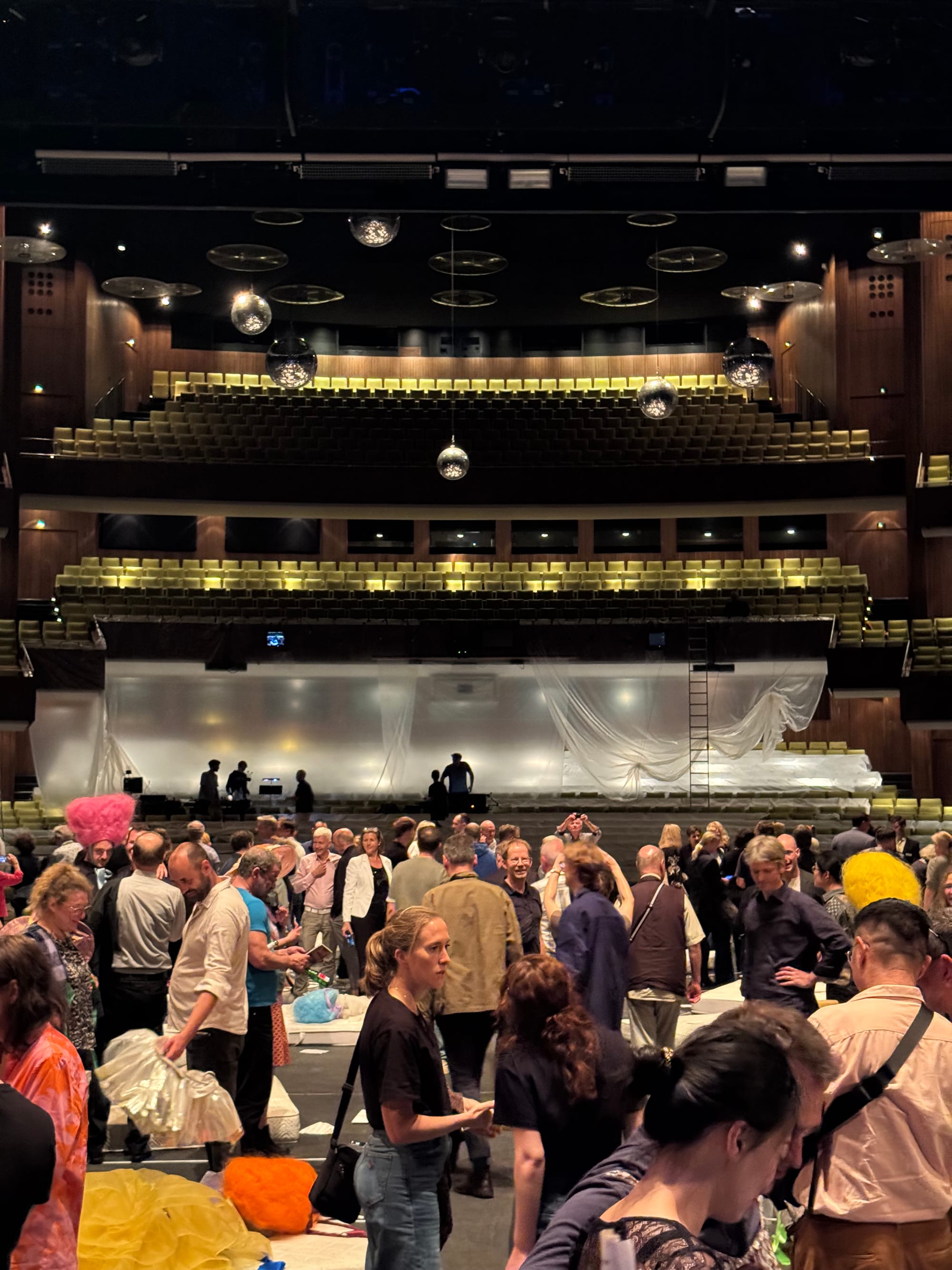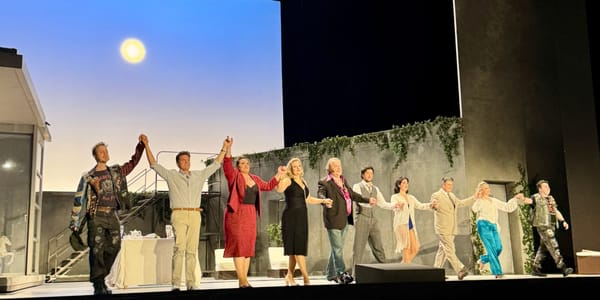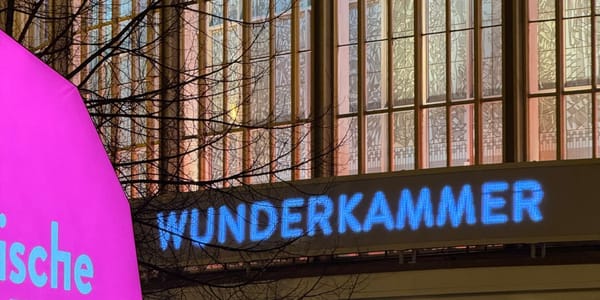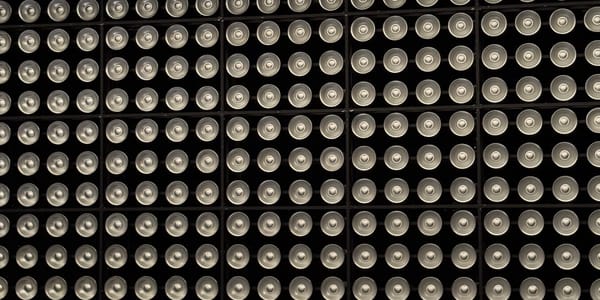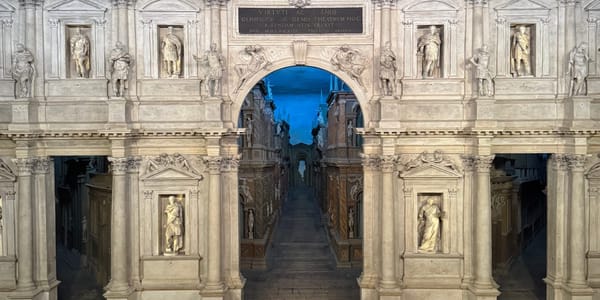Aufstieg und Fall der Stadt Mahagonny at Deutsche Oper Berlin
A libertarian fever dream becomes a masterclass in why community is our only defense against collapse—and fascism.
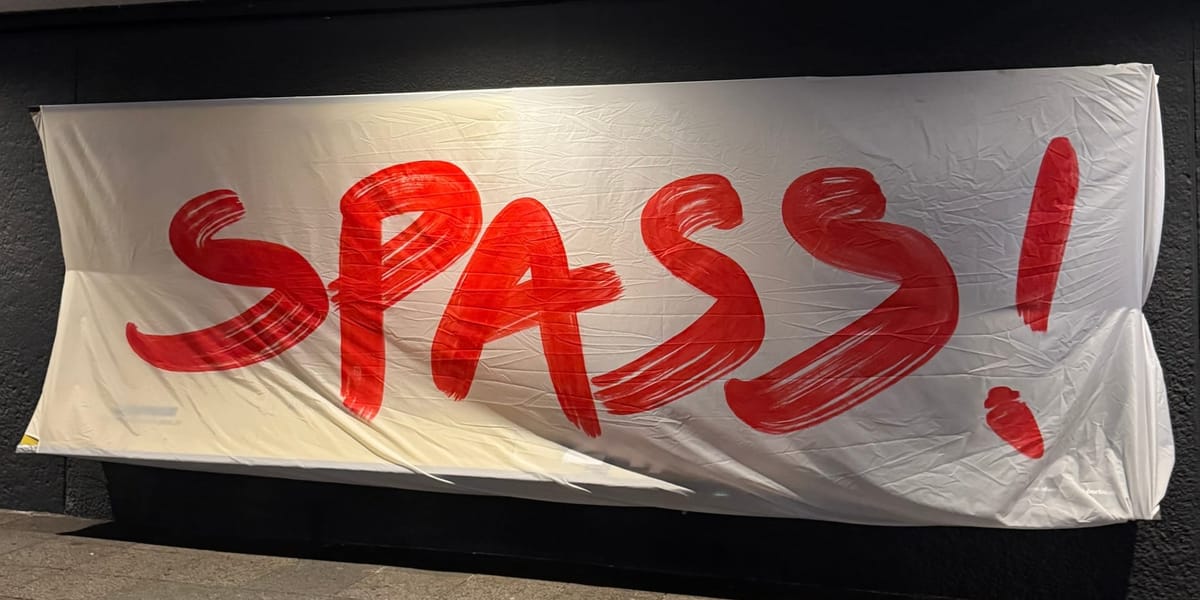
Part three of our summer edition—at this point more highlights reel than backlog. This time it’s Mahagonny: a so-called paradise of freedom and pleasure that this particular production turns into a concerning mirror of the present. Consider it delayed reporting with benefits—and maybe a Prosecco or two along the way, because this one is a long one.
🎭 Aufstieg und Fall der Stadt Mahagonny
🎶 Kurt Weill, 1930
💭 Benedikt von Peter, 2025
🏛️ Deutsche Oper Berlin
🗓️ 22.07.2025
"ER HAT KEIN GELD, NIEDER MIT IHM"
What happens when the promise of freedom is only the freedom to consume—until you can’t pay anymore? That was already the question in 1930, when Kurt Weill and Bertolt Brecht premiered Aufstieg und Fall der Stadt Mahagonny in Leipzig. Born out of the aftermath of economic collapse and political radicalization, the opera stages a capitalist utopia—“the city of nets”—that quickly reveals itself as a hellscape where every desire has a price and poverty is punishable by death. Almost a century later, Benedikt von Peter’s new production at Deutsche Oper Berlin drags that diagnosis straight into the body of the audience.
We no longer build cities in deserts like Weill imagined; today’s utopias are billionaire seasteads in international waters and moon bases beyond the reach of tax law. But the logic remains the same: the dream of “limitless freedom” really means the freedom of those who can afford it. Everyone else is disposable. And in 2025—when Germany debates whether citizens on Bürgergeld really deserve dignity, and when poverty is treated less as a structural condition than as a moral failure—that critique feels less like Weimar nostalgia than a mirror held uncomfortably close.
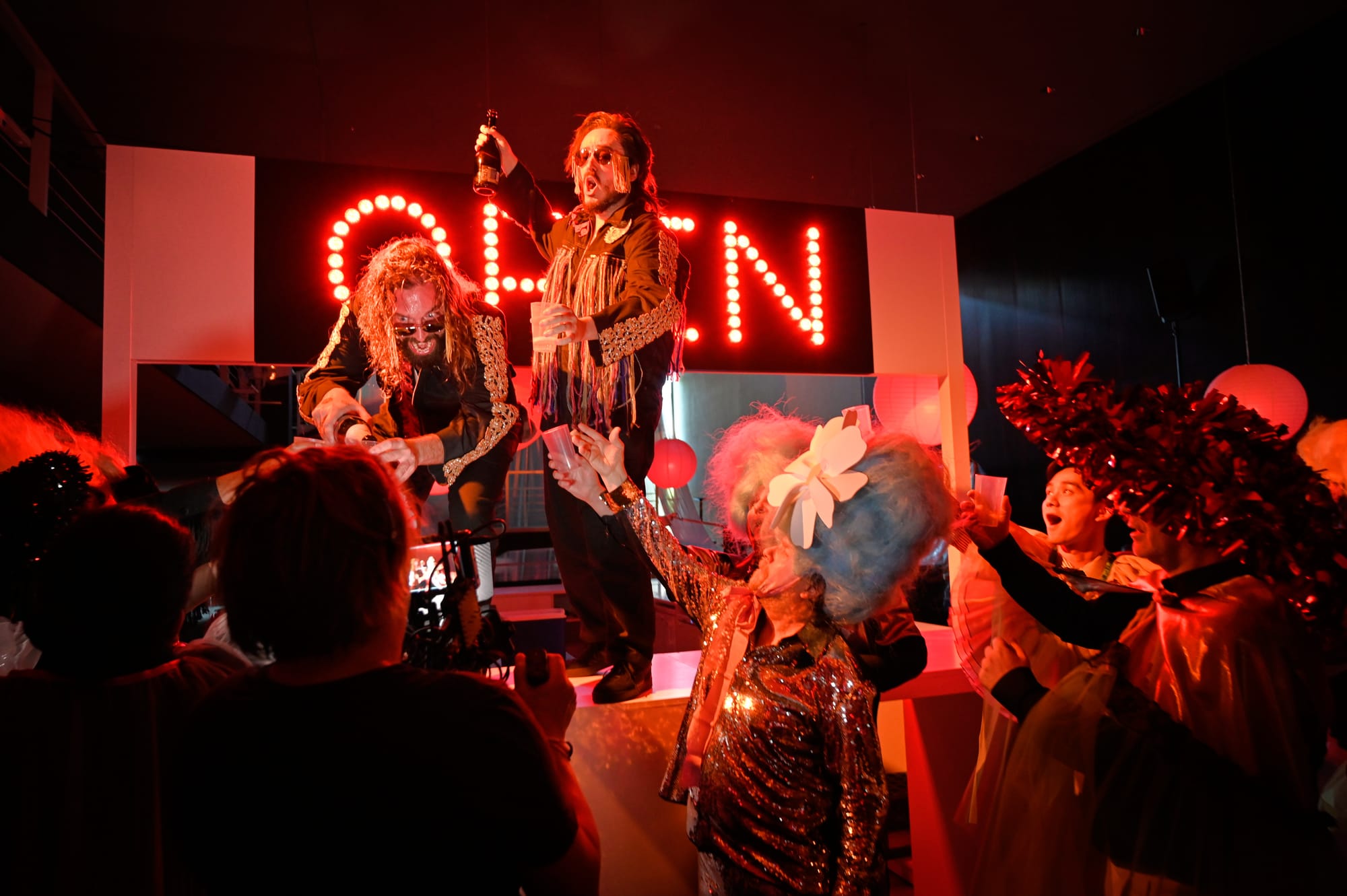
Libertarian Utopia, Capitalist Hell
Mahagonny begins with three fugitives founding a city in the desert. A libertarian utopia: seven days without work, a promise of peace, love, and abundance. But in practice, everything has its price. Sex is love only if you can afford it. Food is sustenance only if you can pay for it. Gambling, drinking, desire—every liberty is transactional. The poor die, quite literally, because they cannot pay.
If Las Vegas is the twentieth-century echo of Mahagonny, then tomorrow it might be Elon Musk’s Mars colony. It's different, but it's not: carve out a zone where laws don’t apply, where desire has no limits—unless you’re poor and can't pay the entry fee. Von Peter’s production refuses to let this remain allegorical. He makes the audience inhabit Mahagonny.
Entering Mahagonny
Von Peter is known for dissolving the safe ritual of the opera house. In his Matthäus-Passion, the audience sat on stage, the choir in the auditorium, the orchestra scattered throughout. In Aida, musicians and singers mingled with spectators, collapsing the hierarchy between stage and stalls. Mahagonny is the culmination of this method: from the moment you enter, you are already a citizen of the city.
The opera house becomes disorienting. Actors greet you at the door: “Welcome to Mahagonny!” No assigned seat, no clear direction, no familiar opera house etiquette to guide you. The foyers, staircases, even the toilets become performance spaces. Screens relay what you miss elsewhere, like a concert filtered through Instagram stories—an art of fragmentation and ephemerality. You are forced to confront your agency: where to go, what to see, whether to join. The ritual of opera-going—ticket, seat, overture—is gone. In its place: chaos, freedom, and discomfort.
That discomfort is key. Audience members today are conditioned to watch silently, clap politely, maybe boo at the end. Active participation has been drained from social life, just as unions, parties, and grassroots movements have waned. Neoliberalism has made us spectators of society. Von Peter confronts that head-on: here, the audience is not allowed to remain passive. Costumes are distributed. Actors interact with you. You are part of the city’s rise and fall, and you can intervene—if you choose to.
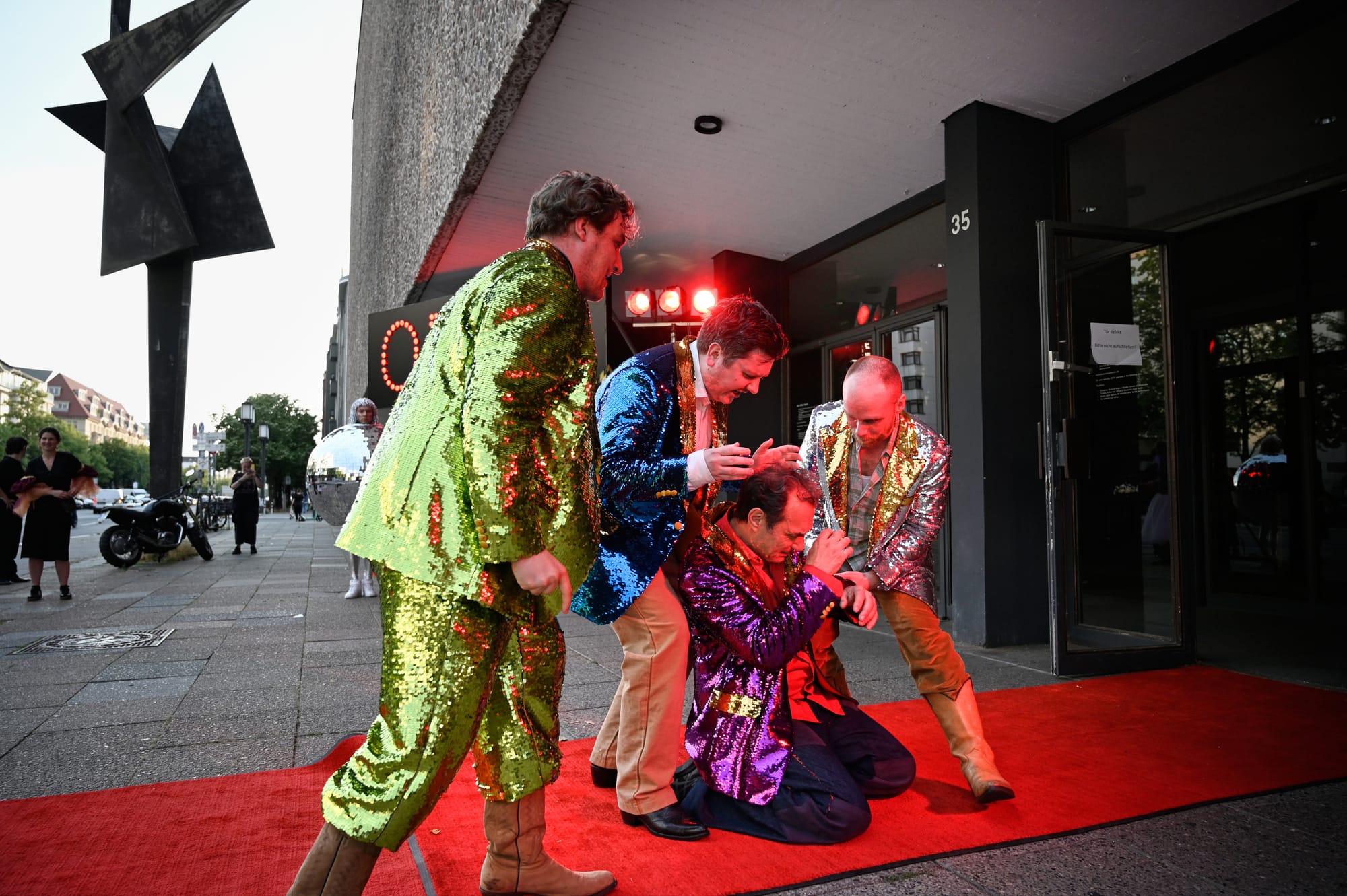
The Foyer as the City of Nets
Most of the first half unfolds in the vast brutalist foyer of Deutsche Oper which becomes a post-apocalyptic marketplace where the 600-person audience (a third of usual capacity—scarcity economics in action) mingles with performers in ostentatious Hunger Games Capitol drag: towering wigs, fluffy gowns, decadent capes that scream wealth and decay in equal measure. Normally a clean, functional intermission space, it is here apocalyptically transformed into something between The Last of Us and Stranger Things. Flickering lights, eerie echoes, familiar architecture rendered alien. It's Deutsche Oper, clearly, but it's also not.
Bars operate throughout the foyer during the whole performance, serving Prosecco at ten euros a glass—until prices begin to fall. Seven euros. Five. Three. Staff shout the numbers through the crowd like traders on an exchange floor. The German audience, initially hesitant, rushes forward once the price hits rock bottom. I overheard one man demanding compensation for having paid seven when the current rate was three. A perfect little parable: greed, envy, cheating the system.
It’s funny, but it’s also chilling. The opera house becomes an experiment in dynamic pricing, not unlike what supermarkets and airlines already trial with hyperindividualized offers. The audience doesn’t just watch Mahagonny—they enact it.
The Storm and the Shelter
Everything shifts in the second half when hurricane warnings evacuate everyone to the auditorium. Suddenly, all 600 participants—audience, musicians, singers, actors—are huddled together on mattresses across the massive open stage, hunkering down like tornado shelter survivors (a visceral throwback for this Alabama-raised reviewer to childhood disaster drills). The orchestra retreats on a moving platform, and silence falls.
It’s chillingly effective. Humanity huddling together against forces beyond its control. A biblical flood, a climate crisis allegory, a reminder that whatever we build is fragile. There's pathos in this, if it weren't so numbingly topical: While wildfires rage across Southern Europe and temperatures in Turkey soar past 50 degrees Celsius, Germany debates the intensity of the climate crisis. In that awkwardness, it feels less allegory than prophecy.
When the storm subsides, Mahagonny remains the only city standing. Jim, one of the Alaskan gold miners, dreams of starting anew: no rules, no limits, everyone does as they please. What begins as utopia quickly curdles into Sodom and Gomorrah. The number counter next to the orchestra ticks downward as characters die—eating, drinking, fucking, fighting themselves to death. Costumes are shed, bodies reduced to silhouettes clad in white linen, one by one leaving the stage.
It's giving Lord of the Flies, except with adults who should know better. A society stripped of constraint does not become free—it becomes self-destructive.
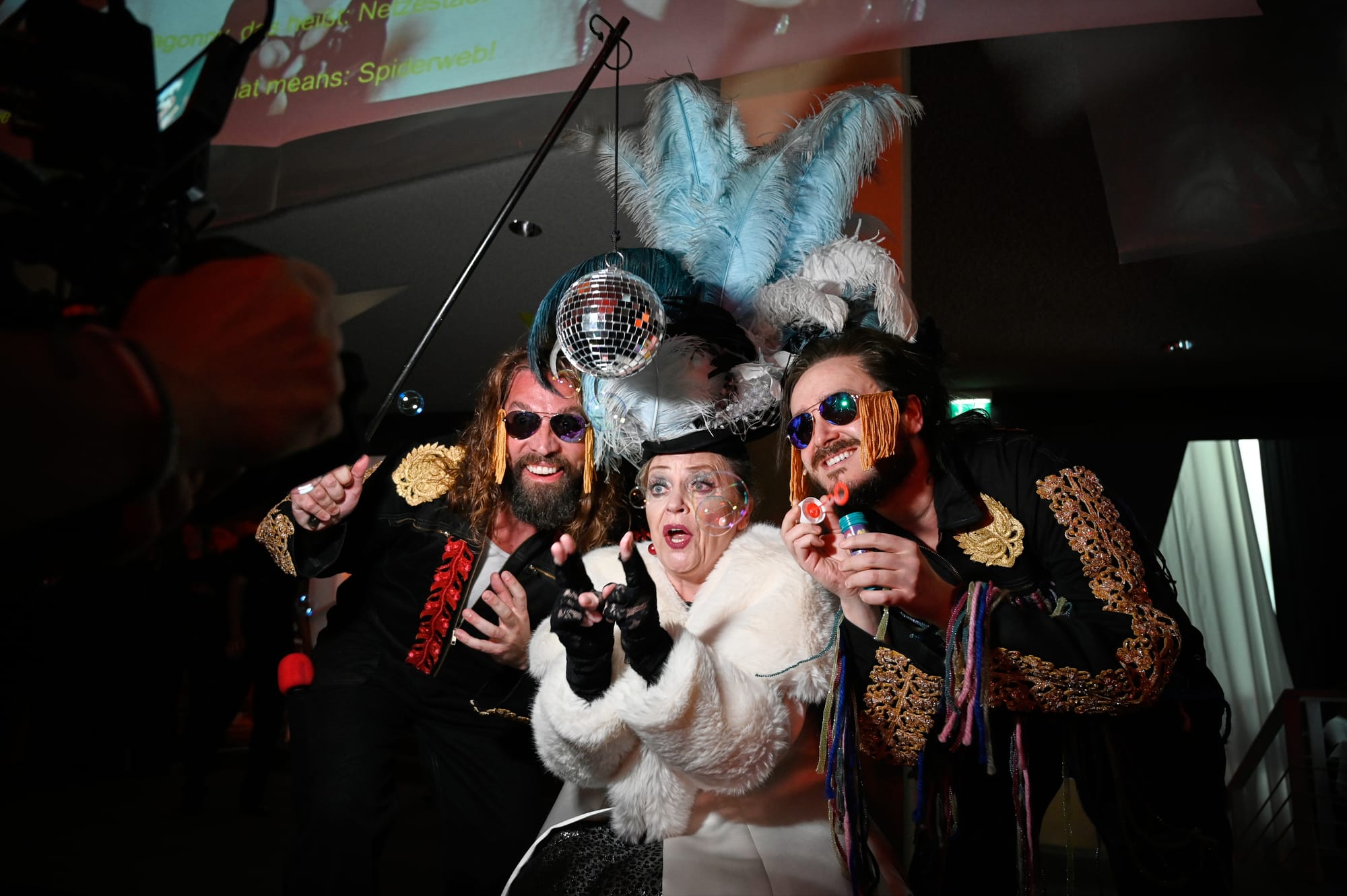
Poverty as a Crime
Jim, too, is eventually sentenced to death. His crime? Not theft, not violence, but poverty. He cannot pay for the drinks he consumed, nor the wager he placed. “Er hat kein Geld—nieder mit ihm.” If there is one line that condenses the opera’s message into a brutal aphorism, this is it. Poverty itself is, and should be, punishable.
At the end, Jim reflects: “Als ich in diese Stadt kam, um mir mit Geld Freude zu kaufen, war mein Untergang besiegelt.” A bitter truth: money cannot buy happiness, but poverty guarantees misery. In 1930, this was radical critique. In 2025, it is banal reality (someone tell Friedrich Merz).
The Posters of Silence
And yet, one of the most unsettling moments came at the very end, when audience intervention was once again requested. After the destruction of Mahagonny, during the opera's introspective quasi-epilogue, children entered the stage with blank posters, handing them to audience members along with pens. The unspoken prompt was clear: write something you believe in, something worth shouting in the street. A bold statement, a demand, a truth.
After three hours of anti-capitalist opera, after experiencing firsthand how capitalism reduces human relationships to transactions, after literally watching society collapse under the weight of unchecked greed—the audience struggled to write anything meaningful. I watched people around me awkwardly stare at blank paper, paralyzed not just by performance anxiety but perhaps by something deeper: the terrifying realization that late-stage capitalism has made us forget how to imagine alternatives. One person wrote "moral" then crossed it out. Another managed something about money. But where were the calls for wealth caps? For community ownership? For any systematic challenge to the forces the opera had just spent three hours dissecting? Maybe a doodle of a guillotine?
This is the real tragedy of von Peter's Mahagonny. Even when presented with a perfect artistic framework for collective action—600 people who've just experienced community formation, witnessed capitalism's failures, and been handed literal tools for protest—we remain isolated individuals, too atomized by decades of neoliberal conditioning to articulate shared visions for a better world.
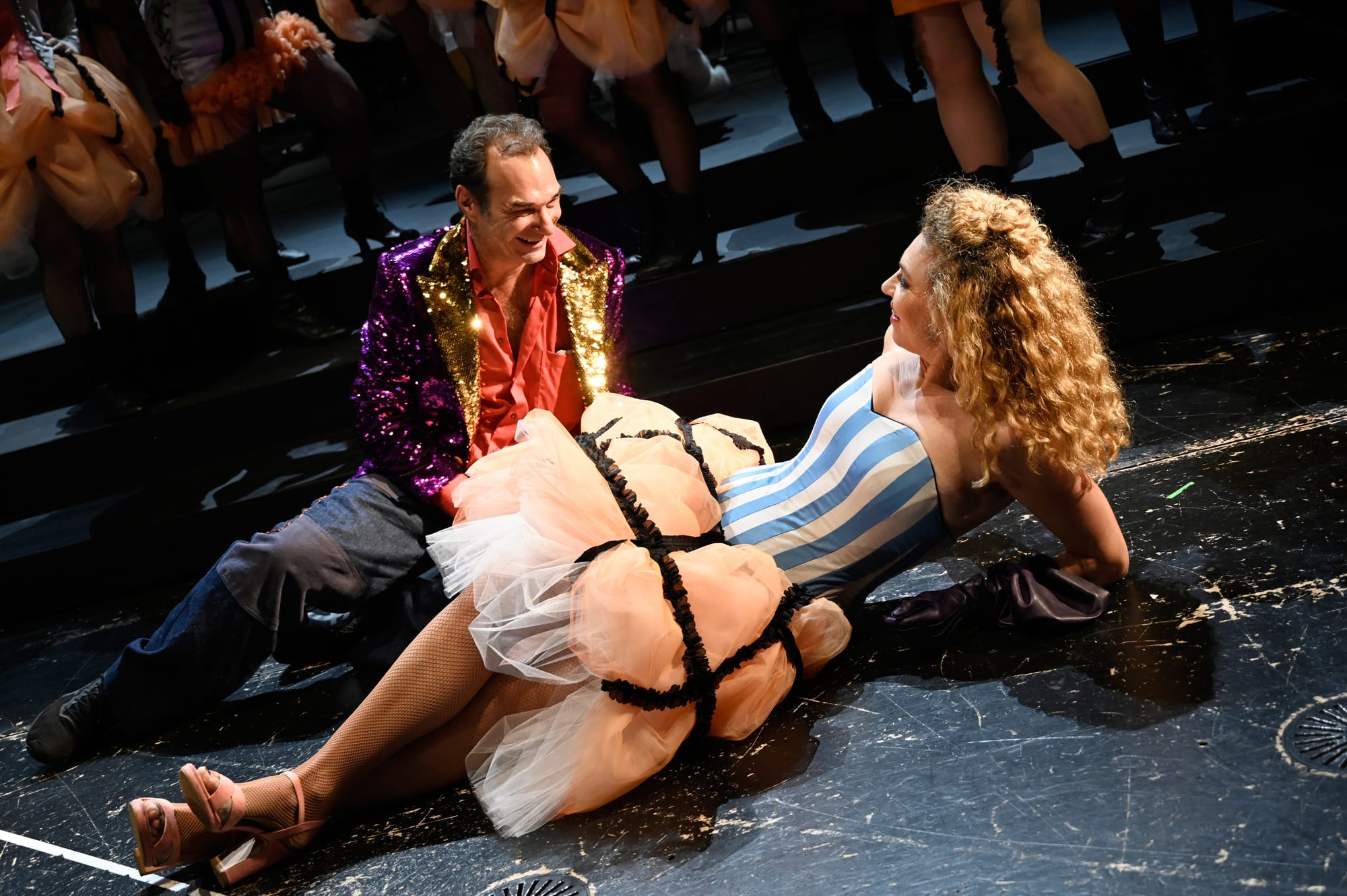
Mahagonny and Us
The program notes cite Harald Welzer's argument that community is our only anchor against fascism—a thesis that feels urgently relevant as tech billionaires, populists, and actual fascists band together to create an authoritarian, capital-dominated future that looks nothing like the liberal democracy we thought had won the Cold War.
But von Peter's production reveals the catch-22: capitalism systematically destroys the very community bonds we need to resist fascism. We're conditioned to consume as individuals, live as individuals, solve problems as nuclear families rather than villages. The radically lonely individual—tracked by smart watches, served by algorithm-optimized delivery systems, never required to negotiate with neighbors or collaborate on shared challenges—is capitalism's ideal consumer and fascism's perfect recruit.
This Mahagonny forces us to confront that reality by creating the conditions for community and watching us fail to sustain it. It's not enough to critique capitalism; we have to remember how to build alternatives. And based on those dispiriting posters, we're not there yet.
A Doomsday Outlook
Kurt Weill and Bertolt Brecht imagined Mahagonny as a satire of capitalist greed, staged on the brink of fascism. Benedikt von Peter restages it in 2025 not as history, but as present tense. He turns Deutsche Oper into Mahagonny itself, and we—the audience—become its citizens, complicit in its rise and collapse.
This (collaborative) production asks: if even here, in art, we cannot imagine collective mobilization, what hope is there outside? If the city of nets collapses because its citizens cannot act together, what about our own cities, our own democracies?
Mahagonny’s lesson is as stark as ever: in a society that hates poverty, worships consumption, and isolates individuals, collapse is not a possibility—it is inevitable. The question is whether we'll choose to do something about it or just rush to buy cheaper Prosecco while we let it happen.
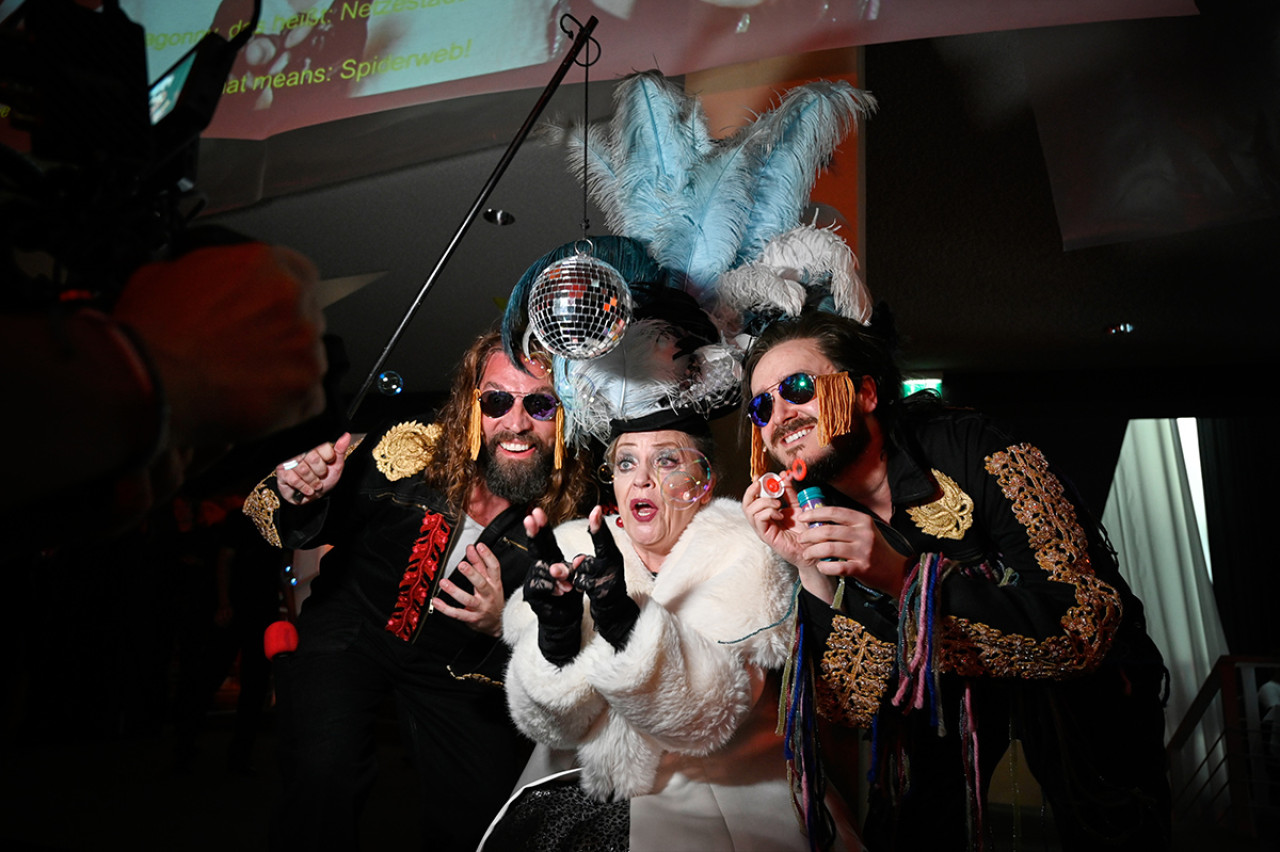
Cast
Conductor Stefan Klingele
Director Benedikt von Peter
Co-directing Caterina Cianfarini
Set design Katrin Wittig
Collaboration set design Romy Rexheuser
Costume design Geraldine Arnold
Lighting design Ulrich Niepel
Video Bert Zander
Sound design Benjamin Schultz
Dramaturgy Sylvia Roth, Carolin Müller-Dohle
Chorus Master Jeremy Bines
Directors Workers' chorus Philip Lawton, Senta Aue
Leokadja Begbick Evelyn Herlitzius
Fatty Thomas Cilluffo
Dreieinigkeitsmoses Robert Gleadow
Jenny Hill Annette Dasch
Jim Mahoney Nikolai Schukoff
Jack O'Brian Kieran Carrel
Bill Artur Garbas
Joe Padraic Rowan
Chorus Chor der Deutschen Oper Berlin
Workers' chorus Generationenchor der Deutschen Oper Berlin, Mitarbeiter*innen der Deutschen Oper Berlin
Orchestra Orchester der Deutschen Oper Berlin
Live Camera Kathrin Krottenthaler, Bert Zander, Hannah Dörr
